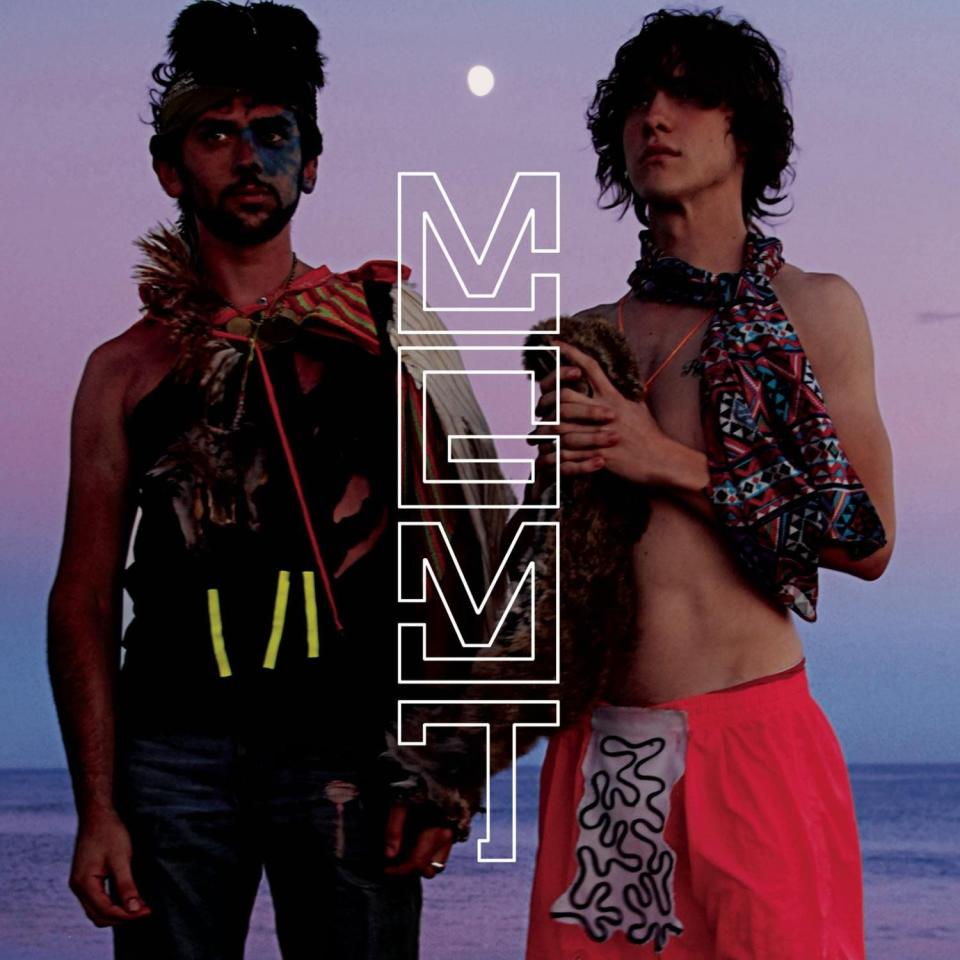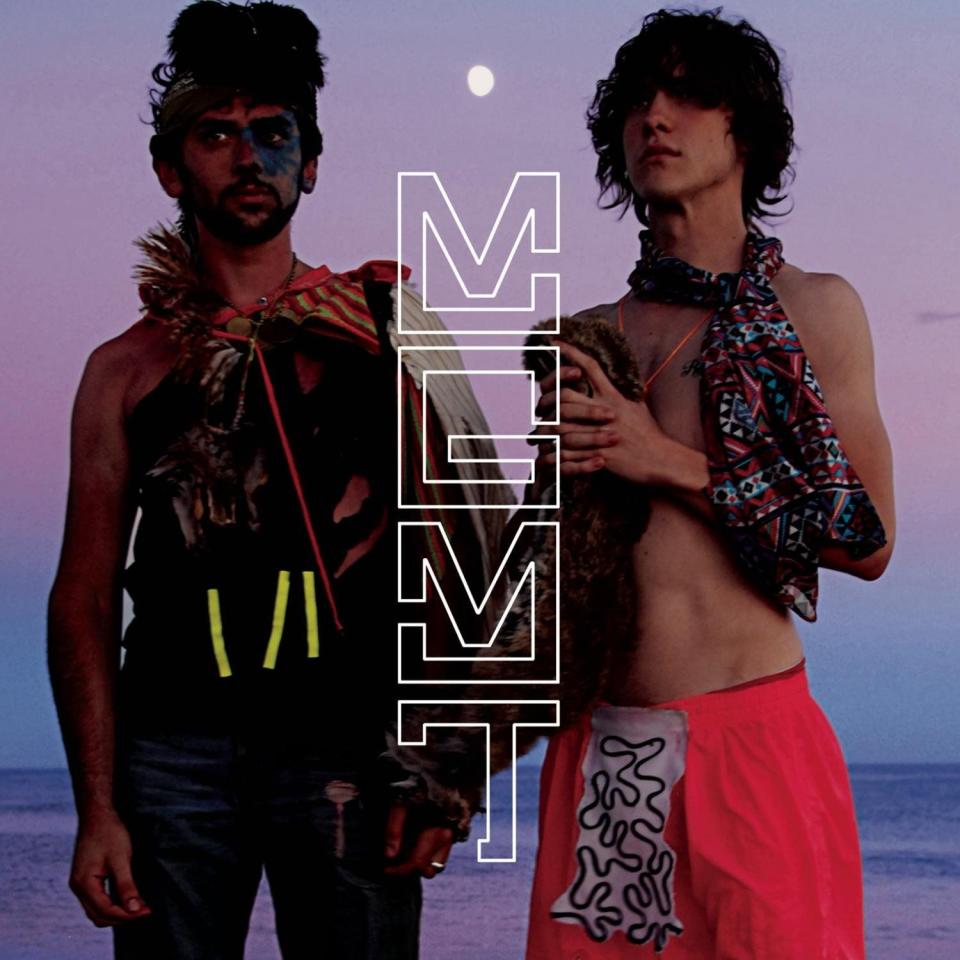10 Years Later, MGMT’s Oracular Spectacular Sounds Remarkably Prescient
In the music video for their 2008 single “Electric Feel”, MGMT hunt down the moon. Stranded in the jungle with a few friends, a few dogs, and a band of animatronic animal puppets, the neo-psychedelic rock duo shoot harpoons into the night sky, puncture the moon, and drag it down to their camp. It’s only about the size of a weather balloon. They slit it open. The moon, it turns out, is full of pixels that pour out in a neon gush. They gather the fluid in a bowl, smear it over their faces, their necks, their bare shoulders, and then they return the moon to the sky.
This lysergic fantasy, along with the ones that illustrated “Time to Pretend” and “Kids”, shows its age. Watching it is a little like leafing through an Urban Outfitters catalog from a decade ago: It’s invested in a hyperspecific concentration of hipness, all bright colors and “tribal” markings and shaggy, androgynous fits. It also nods subtly to the draw of a newly ubiquitous internet, a naive, playful internet, one replete with spontaneity and irreverence instead of the cold, gray cast of 2018’s online mood.
The music on MGMT’s debut album, Oracular Spectacular, now 10 years old, reveals a parallel investment. It mutated the early aughts New York rock epitomized by The Strokes and Interpol — bands who took their nostalgia for guitars and vinyl and jean jackets and well-pressed suits all too literally — into a scrappy patchwork of hippie levity and glam shimmer. MGMT hung somewhere among the ’60s and ’70s, but as their first three singles caught hold of the airwaves, it became clear they were singing to something in the new millennium, too. What they had on display wasn’t quite the greasy disaffection perfected by Julian Casablancas, nor was it the somber new wave cosplay of Paul Banks. They shared radio stations with The Killers, but little of their bombast; Andrew VanWyngarden sang small, as if into a laptop microphone.
Early aughts radio rock never played to a world newly infected by widespread access to personal technology. Computers still represented a breach in real life, and real life was, ostensibly, where music happened. The Strokes, The White Stripes, and the rest of the “the” bands tapped into a reactionary cultural strain, emulating bygone decades in an attempt to fortify themselves against a rapidly changing technological sphere. There was comfort in pretending it was the ’70s, but by 2008, something had changed. The kids who had grown up tapping away at keyboards were old enough to start blogs and bands. The iPhone existed. Digital spheres had woven themselves deeper into everyday life, and their ubiquity was still new enough to seem utopian.
It’s not so much that MGMT were making music about the internet as it was that they made music inflected by it. They followed in a vein opened by acts like Dan Deacon and Animal Collective, artists who worked cheap synthesizers up into a froth and who fixated, like early internet users, on animals. Deacon’s 2007 song “Wham City” renders the Baltimore artists’ collective of the same name as “a sick band of ghosts and cats and pigs and bats.” Animal Collective whinged about rabbits while giving themselves names like Panda Bear. By the time VanWyngarden and his bandmate Ben Goldwasser showed up with their indelible four-note basslines and minor-key synth scales, indie rock’s neo-psychedelia had well established itself. It was simultaneously apocalyptic and utopian, like a group of castaways recreating Eden in the wake of nuclear devastation, befriending animals and dancing naked amid the ruins.
Most of all, it was colorful. Even when, like Animal Collective, MGMT made no sense (or made a hallucinogen-addled kind of sense, anyway), they relished their gobbledygook lyrics. Think of how VanWyngarden pronounces the word “trees” at the end of “Kids”, like he’s the first person ever to see a forest. Think of how he miraculously pulls off the line “you shock me like an electric eel” with devil-may-care cool. It’s absurd, this album; its videos depict hand-drawn title cards and giant toucans and cats with lasers coming out of their eyes, like a tumble-dryer full of Threadless tees. It’s also rife with ambivalence about its own existence. On “The Handshake,” MGMT compare their own record deal to a tab of acid about to launch them down a bad trip. “I’m a curse and I’m a sound/ When I open up my mouth,” VanWyngarden sings at the end of “Weekend Wars”, as if he’d rather not be singing at all, as though he’d be doing us all a favor by keeping his mouth shut.
As bad as signing a record deal might have tasted to a pair of young bohemians, it was better than the alternative. “Yeah, it’s overwhelming, but what else can we do?/ Get jobs in offices and wake up for the morning news?” VanWyngarden sings on one of “Time to Pretend’s” most earnest lines. He’s painting the image of the suit-as-square in comparison to his own wild and free self, a classic hippie dualism, but he’s also alluding to the precarity that would come to define his generation over the next decade. Even if he opted for that office job, there’s no guarantee he’d be able to pin one down — not in 2008 and not in 2018. Might as well become a rock star or at least the closest thing this century has to them: a Columbia signee with a few enduring hits in your back pocket.
Like a lot of millennial art, Oracular Spectacular teeters on the edge between boundless hope and utter cynicism. It is the party happening after the world ends, and of course the world is going to end given how young people — “The Youth”, in MGMT’s inflated, half-sarcastic parlance — are as disposable as ever to the powers that be. Whatever utopianism the album presents gets undercut by its circumstances: financial ruin, cultural toxicity, collapsing infrastructure, and all the other pathogens that have only swarmed since its release. Oracular Spectacular’s endurance rests on its prescience; whatever was in the water then, MGMT tasted it. “Electric Feel” sounds as good on Frank Ocean’s 2011 mixtape Nostalgia, Ultra as it did in 2008 and as it does now. “Time to Pretend” plays like a half-resigned, half-ecstatic ode to the fact that the rules of the 20th century won’t cut it anymore, and yet we still have to play by them. Everyone is pretending and nothing is guaranteed. Maybe that’s a death sentence or maybe it’s freedom. Either way, MGMT saw it coming.


